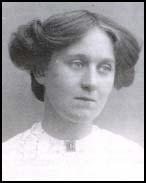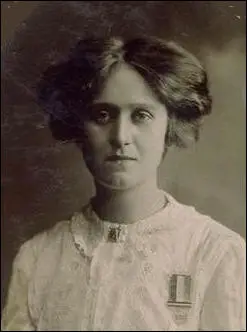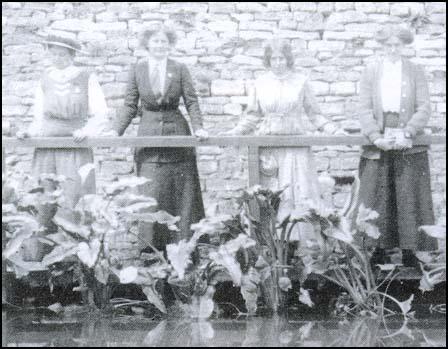Laura Ainsworth

Laura Ainsworth, the daughter of a school inspector, was born at Blything, Northumberland, in 1885. She was educated in Salisbury and after leaving school she became a teacher.
Ainsworth joined the Women Social & Political Union and resigned from her teaching post and in June 1909 she joined Gladice Keevil as a WSPU organiser in Birmingham.
On 22nd September 1909 Ainsworth, Mary Leigh, Charlotte Marsh and Rona Robinson conducted a rooftop protest at Bingley Hall, Birmingham, where Herbert Asquith was addressing a meeting from which all women had been excluded. Using an axe, Leigh removed slates from the roof and threw them at the police below. Sylvia Pankhurst later recalled: "No sooner was this effected, however, than the rattling of missiles was heard on the other side of the hall, and on the roof of the house, thirty feet above the street, lit up by a tall electric standard was seen the little agile figure of Mary Leigh, with a tall fair girl (Charlotte Marsh) beside her. Both of them were tearing up the slates with axes, and flinging them onto the roof of the Bingley Hall and down into the road below-always, however, taking care to hit no one and sounding a warning before throwing. The police cried to them to stop and angry stewards came rushing out of the hall to second this demand, but the women calmly went on with their work."
As Michelle Myall has pointed out: "The police attempted to move the two women by, among other methods, turning a hosepipe on them and throwing stones. However, Charlotte Marsh and Mary Leigh proved to be formidable opponents and were only brought down from the roof when three policeman dragged them down."

Ainsworth, Rona Robinson, Charlotte Marsh and Mary Leigh were all sentenced to two weeks' imprisonment. On arriving at Winson Green Prison, on 22nd September, she broke the window in her cell in protest, demanding to be treated as a political offender. "Accordingly at nine o'clock in the evening I was taken to the punishment cell, a cold dark room on the ground floor - light only shines on very bright days - with no furniture in it." The four women decided to go on hunger-strike, a strategy developed by Marion Wallace-Dunlop a few weeks earlier. Wallace-Dunlop had been immediately released when she had tried this in Holloway Prison, but the governor of Winson Green Prison, was willing to feed the three women by force. The prison doctor recorded that "she is very determined and it is necessary still to administer food through the tube."
On her release she was taken to a nursing home and criminal proceedings, against the prison authorities. As Elizabeth Crawford, the author of The Suffragette Movement (1999), has pointed out: "The case ensured that maximum publicity was given to the new level of militancy."
In January 1910 Ainsworth worked with Mary Phillips in Bradford during the 1910 General Election campaign. According to B. M. Willmott Dobbie, the author of A Nest of Suffragettes in Somerset (1979), she "waved a gruesome poster" on the subject of force-feeding at Herbert Asquith, shouting "Why did you do this to me."
Ainsworth visited Eagle House near Batheaston in April 1911 with Annie Kenney and Charlotte Marsh. The house was owned by Colonel Linley Blathwayt and Emily Blathwayt, two strong supporters of the campaign for women's suffrage. Colonel Blathwayt planted a tree, a Cupressus Lawsoniana Wisselii, in her honour in his suffragette arboretum in a field adjacent to the house.

Ainsworth became the WSPU organiser in Bolton and Bury in February 1910. That summer she ran a holiday campaign in Southend-on-Sea. The following year she was WSPU organiser in Maidstone and in July 1911 took over from Annie Williams in Newcastle.
Some leaders of the WSPU such as Emmeline Pethick-Lawrence, disagreed with this arson campaign. When Pethick-Lawrence objected, she was expelled from the organisation. Others like Ainsworth, Elizabeth Robins, Jane Brailsford, Eveline Haverfield and Louisa Garrett Anderson showed their disapproval by ceasing to be active in the WSPU and Hertha Ayrton, Janie Allan and Elizabeth Garrett Anderson stopped providing much needed funds for the organization.
After leaving the Women Social & Political Union Ainsworth became active in the National Political League. She was also chairman of the North-East Area of the Women's Section of the Royal British Legion and the honorary secretary of the League of Nations Union in Northumberland.
Laura Ainsworth died in 1958.

